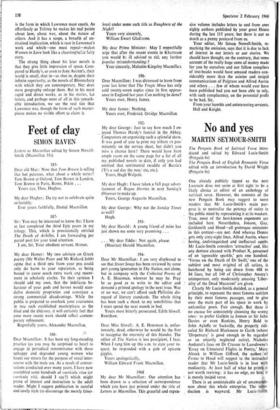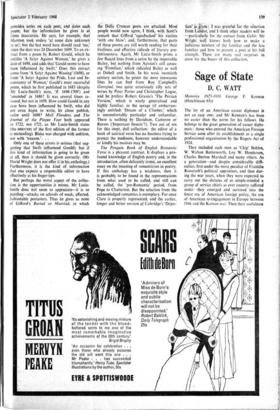No and yes
MARTIN SEYMOUR-SMITH
The Penguin Book of Satirical Verse intro- duced and edited by Edward Lucie-Smith (Penguin 6s)
The Penguin Book of English Romantic Verse edited with an introduction by David Wright (Penguin 6s) One already publicly tipped as the next Laureate does not seem at first sight to be a likely choice as editor of an anthology of satirical verse. However, the contents of the new Penguin Book may suggest to some readers that Mr Lucie-Smith's main pur- pose is to neutralise the potency of satire in the public mind by representing it at its weakest. True, Most of the best-known exponents are included here. Nevertheless, Jonson, Gay, Goldsmith and Hood—all grotesque omissions in this context—are not. And whereas Donne gets only sixty-eight lines, Alfred Austin, whose boring, undistinguished and ineffectual squibs Mr Lucie-Smith considers 'attractive' and, like any denture cleaned with Product X, possessed of an 'agreeable sparkle,' gets one hundred. 'Verses on the Death of Dr Swift,' one of the subtlest and most original of all satires, is butchered by being cut down from 488 to 84 lines; but all 140 of Christopher Anstey's unimportant, only moderately amusing 'Liber- ality of the Dead Macaroni' are given.
• Clearly Mr Lucie-Smith decided, as a general principle, to represent the most famous satirists by their most famous passages, and to give over the main part of his space to work by unfamiliar poets. Fair enough. But there is no excuse for consistently choosing the wrong ones : to prefer Guilpin to Jonson or Sir John Davies or even Rankins, Henry Bold to John Ayloffe or Sackville, the properly ridi- culed Sir Richard Blackmore to Garth (whose 'Dispensary' is good enough to be regarded as an unjustly neglected satire), Nicholas Amhurst's lines on Dr Crassus to Lansdowne's `Essay on Unnatural Flights in Poetry,' Mary Alcock to William Gifford, the author of Festus to Hood will suggest to the instructed reader that Mr Lucie-Smith is in love with mediocrity. At least half of what he prints is not worth reviving: it has no edge, no bite; it is merely insipid verse.
There is an unmistakable air of amateurish- ness about this whole enterprise. The intro- duction , is wayward. Mr Lucie-Smitb prOvides totes oh eaCh 'poet,' and 'dates each poeni; but the' information he givet is at times inacctirite: He says, for example, that Marston took orders 'at Some date unknown to us'; but the last Word here should read 'me,' since the date was 24 December 1609. To an ex- tract from a poem by Robert Gould, which he entitles' 'A Satyr Against Woman,' he gives a date Of 1698, and adds that 'Gould seems to have been irifluended by Swift.' Does this extract come from 'A Satyr 'Against Wooing' (1698), or from 'A Satyr Against the Pride, Lust and In- constancy of Woman,' Gould's most successful poem, which he first published in 1683 (despite Mr Lucie-Smith's note, 11. 1698-1709') and 'amended' in 1686? It was several times re- issued, but not in 1698. How could Gould in any case have been influenced by Swift, who did not even begin to write, let alone publish, satire until 1698? Moll Flanders and The Journal of the Plague Year both appeared in 1722, not 1721, as Mr Lucie-Smith states (the !Ammo of the first edition of the former is misleading). Blake was charged with sedition, not with 'treason.'. . .
Only one of these errors is serious (that sug- gesting that Swift influenced Gould); but if this kind of information is going to be given at all, then it should be given correctly. (Mr David Wright does not offer it in his anthology.) Furthermore, it is the kind of information that one expects a responsible editor to have effectively at his finger-tips.
But perhaps the worst aspect of the collec- tion is the opportunities it misses. Mr Lucie- Smith does not seem to appreciate—it is so puzzling—attacks on schools of weak, affected, fashionable poetasters. Thus he gives us node of Gifford's Baviad or Maeviad, in which the Della. Crimean 'poets are attacked. Mast people would now agree, I think, with Scott's remark that Gifford `squabashed' his victims 'with one blow'; and, furthermore, that' parts of these poems are still worth reading for their liveliness and effective ridicule of literary pre- tentiousness. Again, Mr Lucie-Smith prints a few flaccid lines from a satire by the impossible Bailey, but nothing from Aytoun's still amus- ing Pirmiliad,' which ridiculed Bailey as well as Dobell and Smith. In his weak twentieth century section, he prints the most innocuous lines he can find from Roy Campbell's Georgiad, two quite atrociously silly sets of verses by Peter Porter and Christopher Logue, and he prefers Robert Graves's The Persian Version,' which is nicely generalised and highly familiar, to the savage (if embarrass- ingly entitled) 'Dream of a Climber,' which is uncomfortably particular and unfamiliar. There is nothing by Davidson, Cameron or Reeves (Important Insects'?). Two out of ten for this inept, dull collection: the editor of a book of satirical verse has no business trying to protect the mediocre, however understandable or kindly his motives may be.
The Penguin Book of English Romantic Verse is a pleasant contrast. It displays a pro- found knowledge of English poetry and, in the introduction, often delicately ironic, an excellent essay on the meaning of romanticism in poetry. If this anthology has a weakness, then it is probably to be found in the representations from what used to be called, and still can be called, the 'pre-Romantic' period, from Pope to Chatterton. But the selection from the acknowledged romantics is exemplary. For once Clare is properly represented, and the earlier, longer and better version of Coleridge's Dejee-
- '
lion' is teen:, I was grateful ror the selection (rain Lando; and I think other readers will be —particularly for the extract from Gebir. Mr Wright Well knows both how to make a judicious mixture of the familiar and the less familiar and how to present a poet at his full strength. There are many real surprises in store for the buyer of this collection,



































 Previous page
Previous page